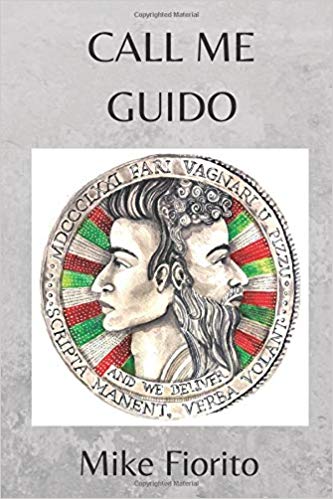I have always been an admirer of everything Italian. Though, admirer does not sound like strong enough a word. Truth is: I believe my soul is Italian, and, in this life, I have been condemned to living away from my culture. For that reason, to satisfy my soul’s hunger, I have been a student of Italian language and culture, and eventually became a teacher of the Italian language and literature. I believe that being immersed in literature and language will bring me closer to my roots (or imagined roots).
Mike Fiorito has been on a similar adventure: Call me Guido tells a story of an American born to a south Italian family in Queens, New York who is trying to make sense of his Italian heritage or to accept the lack of it. A poignant, heartfelt, and confessional short story collection that centers on two tender father-son relationships. The first relationship presents the narrator in the role of a son who feels pressured to learn from his flawed father about their Italian tradition. And the second relationship depicts the narrator in the role of a father who is now curious and ready to find out more about his family’s Italian-American past and transfer what he had learned from his father onward to his sons.
Even though each story could be read independently, this collection as a whole reads like an intense memoir enhanced with the dramatic notes of Italian-American singers from Sinatra to Tony Bennett.
All his life, Mike has been away from the mother culture and never fluent in the language. But, the love of the Italian music that his father transferred to him (the music brought from Italy a long time ago and re-established in the voices of Jimmy Roselli, Ted Fiorito, Adrian Rollini, Nick Lucas, Eddie Lang, Wingy Manone, and others) made for a secure connection to his Italian origins.
At first, the narrator, then very young, didn’t appreciate it. “When I was a kid, my father played Jimmy Roselli and other Neapolitan singers for me. Back then, I hated it. He took me to the Italian novelty store, E Rossi & Company, on Grand Street in Little Italy as if to impress me with the Neapolitan music they played. It was too Italian for me. Too narrow. I wanted to see the world, not to be imprisoned in our family heritage or national identity.”
“Twenty years later, I’ve amassed a collection of recordings of the Neapolitan singers and read many books and articles on the subject.”
Call me Guido imparts the musical culture of Italian Americans engagingly and memorably. Through his urgent, confessional narrative, Fiorito assumes the role of a teacher. However, Fiorito’s intention was never to preach about the history tiring the readers with facts and dates. “My objective is,” Fiorito writes, “to offer my personal experience with their art and acknowledge the Italian contribution to American Jazz.”
Call me Guido offers a comprehensive yet exciting overview of the Neapolitan musical tradition that found new roots in contemporary American culture.
But, what amazed me the most is tender underlining that like the bel canto smooths through the entire collection and softly reveals the son’s love letter to his late father. The father, who, although always struggled with gambling addiction and left the family in debt, taught his children of love and compassion. “And now I talk to my father in the form of essays and stories.” Fiorito writes. “I’ve taken a grand tour of the world, having missed the things that were in front of me for most of my childhood. But there’s still time for me to do excavation. And in this process, my father’s voice emerges.”
As I believe that being close to the Italian language and literature will always keep me close to my imagined Italian roots, so does Mike Fiorito trust that being immersed in the ardent melodies of musica Italiano-America will help him save his family’s heritage.
What he undeniably succeeded with Call me Guido is to share this passion.
Call me Guido is Mike Fiorito’s third book. His previous titles were Freud’s Haberdashery Habits and Other Stories and Hallucinating Huxley. His words have appeared in Ovunque Siamo, Narratively, Mad Swirl, Pif Magazine, and many other publications. Mike is an Associate Editor for Mad Swirl Magazine, and he has been nominated for Pushcart Prize.
